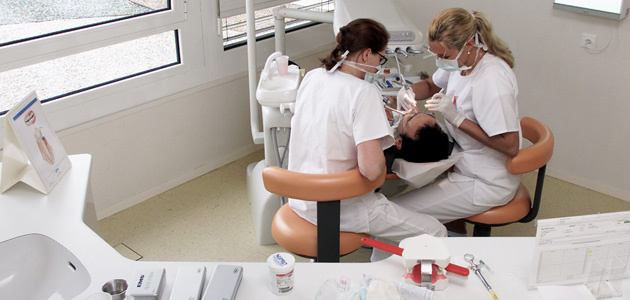
Emergency care
Though consultations of this kind do not require an appointment, we would still advise you to phone in advance to avoid unnecessary waiting. The aim of emergency treatment is to avoid any deterioration in your general condition, to relieve pain or to provide a temporary cosmetic solution. The final treatment will be carried out subsequently by your own dentist or, if you wish, here at our clinic.
Dental hygiene
Care is provided by our team of dental hygienists, the treatment consists of the removal of calculus and plaque. Advice is also given on the different methods of brushing and the use of alternative ways of cleaning your teeth, such as dental floss, inter-dental brushes, etc. We recommend a session at least once a year to ensure an effective check on the health of your gums and early warning of any potential problems.
Teeth whitening
The procedure serves to lighten the colour of teeth. The technique varies according to the type of tooth which is to be treated : vital teeth : a gel contraining carbamide peroxide with oxagen as the active agent is placed in a laboratory-made plastic tray that is fitted over the teeth. The treatment is carried out at home, in accordance with a personalised programme drawn up by your dentist. root-filled teeth (=non-vital) : the active product is placed directly inside the tooth concerned for a number of days, the procedure being repeated until the right shade has been obtained.
Cosmetic treatment
Treatment of this kind is carried out using ceramic and composite resin capable of restoring the form, function and colour of all teeth. Dependind on the extent of the damage, the dentist will either treat the tooth immediately during a single session or will take a mould print so that the dental technician can recreate the missing part. This will then be applied to the tooth during a second session, either as an inlay or an onlay, depending on the scale of the repart. At the present time, virtually no amalgam fillings are used due to the controversy over the toxicity of their mercury content.
Endodontics
Endodontics is the branch of dentistry concerned with the treatment of the nerve or pulp when this sensitive, inner part of the tooth, is affected by caries. The first stage is to eliminate the infected nerve and to enlarge the root canal so that it can be cleaned. The second stage is to fill the root canal, along its entire length if possible, so as to avoid any secondary infection. These painstaking and time-consuming techniques have been considerably refined over recent years. In this regard, our clinics are equipped with state-of-the-art technology, such as nickel-titanium mechanical instruments, ultrasonic micro-inserts and surgical operation microscopes offering magnifications of up to forty times.
Periodontology
This dental speciality comprises with all of the problems relating to gums and the tissue supporting the tooth (bone and ligament). The treatment is carried out by a general dentist if the infection is localized or instead by a specialist if it has spread or is particularly serious or aggressive. The work is conducted over a number of stages in close cooperation with the hygienist. The first step is a root planing to remove plaque and calculus carried out under local anaesthetic. Then, depending on the type of healing, a surgical intervention may be envisaged to futher clean the deepest parts of the roots.
Oral surgery
This covers all tooth extractions, from the simplest to the most complicated. The most frequent requirement is for the removal of wisdom teeth or for the fitting of implants (see below). Other types of surgery include grafts to increase bone volume before implant placement / insertion or to carry out root resections under the operating microscope.
Implantology
With an implant, the natural root of a missing tooth is replaced by an artificial one to which a crown is then anchored. Internationally, implants are made in many different forms and materials and with a variety of surface characteristics. Our clinic mostly uses Straumann® implants, this Swiss manufacturer has established an international benchmark. They are cylindrical in shape and have a rough surface to ensure that the implant heales firmly and quickly inside the bone.
Stomatology
This branch of dental medicine is concerned with lesions occurring in the mouth. Though such lesions may be perfectly benign, they can also be serious enough to warrant medical and/or surgical treatment and/or radiotherapy. Regular visits to your dentist allows a health professional to ckeck your oral condition sistematically, thus ensuring that any lesion is diagnosed early. This is particularly important when in the presence of other risk factors such as smoking. Early diagnosis makes for easier care and faster healing.
Fixed prosthetics
Teeth that are in poor condition can be replaced by crowns made in the laboratory by our technicians. The crowns are then sealed and fixed with adhesive. Crowns are generally made from a precious metal base and a ceramic surface. Entirely ceramic crowns which produce a perfect appearance in esthetically demanding conditions are also used extensively.
Removable prosthetics
In this case, the missing teeth are replaced by a denture fixed in place by clips attached to the remaining teeth. The denture is not permanently fixed in the mouth and must be removed after every meal for cleaning, as well as at night. Though this is less convenient than a fixed prothesis, it may be the only solution if too many teeth are missing. It is also less costly and more adaptable than a fixed prosthesis.
Orthondontics
Orthodontics is concerned with restoring the alignment of the teeth and the functional relationship between the upper and lower teeth using movable or fixed braces. Though this treatment is generally given to children an adolescents, it may be used at any age, providing that the gingival health is satisfactory.
Pedodontics
Pedodontics deals with the dental treatment of children. On the whole, the care given is similar to that provided for adults. We treat children of all ages but it is very difficult or indeed impossible to treat infants under the age of three.
We would recommend parents wishing to take out dental insurance for their children to arrange a first appointment before the child reaches the age of two. Otherwise, provided that no problem occurs beforehand, we would suggest an initial appointment for a child to meet the dentist around the age of four.
Nos soins dentaires
Contactez-nous
Centre de soins dentairesRoute de Saint-Julien 176 bis
1228 Plan-les-Ouates
+41 22 706 22 22
Plan d'accès
soins
d'urgence
022 706 22 22
Horaires d'ouverture
Lundi au vendredi
de 8h. à 18h.
